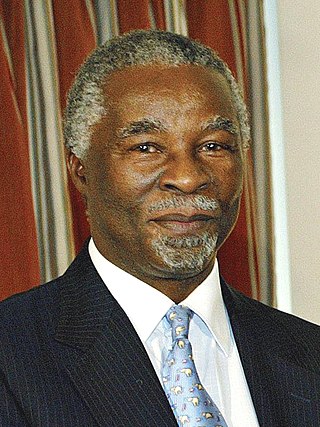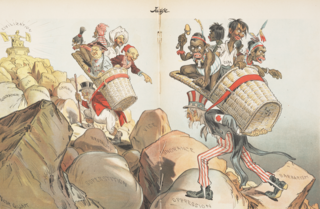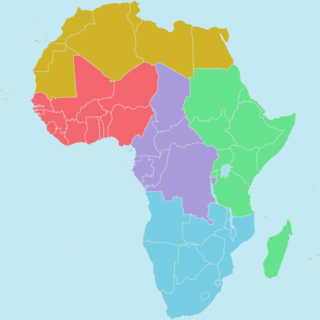In international relations, intergovernmentalism treats states as the primary actors in the integration process. Intergovernmentalist approaches claim to be able to explain both periods of radical change in the European Union because of converging governmental preferences and periods of inertia because of diverging national interests.

Thabo Mvuyelwa Mbeki is a South African politician who served as the 2nd democratic president of South Africa from 14 June 1999 to 24 September 2008, when he resigned at the request of his party, the African National Congress (ANC). Before that, he was deputy president under Nelson Mandela from 1994 to 1999.

The Organisation of African Unity was an African intergovernmental organization established on 25 May 1963 in Addis Ababa, Ethiopia, with 33 signatory governments. Some of the key aims of the OAU were to encourage political and economic integration among member states, and to eradicate colonialism and neo-colonialism from the African continent.

The New Partnership for Africa's Development (NEPAD) is an economic development program of the African Union (AU). NEPAD was adopted by the AU at the 37th session of the Assembly of Heads of State and Government in July 2001 in Lusaka, Zambia. NEPAD aims to provide an overarching vision and policy framework for accelerating economic co-operation and integration among African countries.
The African Renaissance is the concept that the African people shall overcome the current challenges confronting the continent and achieve cultural, scientific, and economic renewal. This concept was first articulated by Cheikh Anta Diop in a series of essays between 1946 and 1960, later collected in a book titled Towards the African Renaissance. Diop's ideas were further popularized by former President of South Africa Thabo Mbeki during his tenure as Deputy President, where the African Renaissance continues to play a key role in the post-apartheid intellectual agenda.

The economy of Africa consists of the trade, industry, agriculture, and human resources of the continent. As of 2019, approximately 1.3 billion people were living in 53 countries in Africa. Africa is a resource-rich continent. Recent growth has been due to growth in sales, commodities, services, and manufacturing. West Africa, East Africa, Central Africa and Southern Africa in particular, are expected to reach a combined GDP of $29 trillion by 2050.

The United States of Africa is a concept of a federation of some or all of the 54 sovereign states and two disputed states on the continent of Africa. The concept takes its origin from Marcus Garvey's 1924 poem "Hail, United States of Africa".

"The White Man's Burden" (1899), by Rudyard Kipling, is a poem about the Philippine–American War (1899–1902) that exhorts the United States to assume colonial control of the Filipino people and their country.
A continental union is a regional organization which facilitates pan-continental integration. Continental unions vary from collaborative intergovernmental organizations, to supranational politico-economic unions. Continental unions are a relatively new type of political entity in the history of human government. Throughout most of human history, political organization has been at the local level and in more recent centuries, the sub-regional ("regional")/sub-continental level ; however, starting with the advent of better transportation, weapons and communication there was for the first time the ability for a union of member states to organize at the continental level. After the devastation of the First and Second World Wars in the middle of the twentieth century, Europe began to slowly integrate with the founding of the "European Community", which became a political union covering much of the European continent.
The 16th World Economic Forum on Africa: Going for Growth was a World Economic Forum economic summit meeting held in Cape Town, South Africa, from May 31 to June 2, 2006. The summit was attended by some 650 political and business leaders from 39 countries, focusing particularly on rapidly increasing African commodity prices. It also examined issues relating to the promotion of investment, improving world opinion, combating hunger, sustainable development, and offer specific initiatives to address these and other economic issues facing part of or the entire continent.

South Africa since 1994 transitioned from the system of apartheid to one of majority rule. The election of 1994 resulted in a change in government with the African National Congress (ANC) coming to power. The ANC retained power after subsequent elections in 1999, 2004, 2009, 2014, and 2019. Children born during this period are known as the born-free generation, and those aged eighteen or older, were able to vote for the first time in 2014.

The African Union (AU) is a continental union of 55 member states located on the continent of Africa. The AU was announced in the Sirte Declaration in Sirte, Libya, on 9 September 1999, calling for the establishment of the African Union. The bloc was launched on 9 July 2002 in Durban, South Africa. The intention of the AU was to replace the Organisation of African Unity (OAU), established on 25 May 1963 in Addis Ababa by 32 signatory governments; the OAU was disbanded on 9 July 2002. The most important decisions of the AU are made by the Assembly of the African Union, a semi-annual meeting of the heads of state and government of its member states.
The African Union is a geo-political entity covering the entirety of the African continent. Its origin dates back to the First Congress of Independent African States, held in Accra, Ghana, from 15 to 22 April 1958. The conference aimed at forming the Africa Day to mark the liberation movement of the African people each year, such as to free themselves from foreign dictatorship and to unite Africa. The Organisation of African Unity (OAU), was subsequently established on 25 May 1963 followed by the African Economic Community in 1981. Critics argued that the OAU in particular did little to protect the rights and liberties of African citizens from their own political leaders, often dubbing it the "Dictators' Club".
The End of Poverty? is a 2008 documentary film about poverty directed by Philippe Diaz. It is narrated by Martin Sheen and was produced by Cinema Libre Studio in association with the non-profit Robert Schalkenbach Foundation. The film was selected for the international critic's week award at the 2008 Cannes Festival.

The member states of the African Union (AU) are divided into five geographical regions.
In South Africa, HIV/AIDS denialism had a significant impact on public health policy from 1999 to 2008, during the presidency of Thabo Mbeki. Mbeki criticized the scientific consensus that HIV is the cause of AIDS beginning shortly after his election to the presidency. In 2000, he organized a Presidential Advisory Panel regarding HIV/AIDS including several scientists who denied that HIV caused AIDS.

Humanitarianism in Africa refers to the intentions and actions of people, nations, and organizations to alleviate human suffering in Africa. Humanitarian policies have focused on improving problems in Africa such as poverty, poor-health, corruption, and ethnic/inter-state conflict. Prominent entities which engage in humanitarian action in Africa include but are not limited to: foreign nations like the United States (US), domestic nations like South Africa, international organizations like the World Bank, the International Monetary Fund (IMF), and the United Nations (UN), Non-Governmental Organizations (NGOs) like the Red Cross and Doctors Without Borders, and even personal celebrities like Bono. Prominent methods of promoting humanitarianism in Africa have been foreign aid, humanitarian intervention, and UN sanctioned peacekeeping.

The African Continental Free Trade Area (AfCFTA) is a free trade area encompassing most of Africa. It was established in 2018 by the African Continental Free Trade Agreement, which has 43 parties and another 11 signatories, making it the largest free-trade area by number of member states, after the World Trade Organization, and the largest in population and geographic size, spanning 1.3 billion people across the world's second largest continent.

Countries of the East African Community (EAC) include the Democratic Republic of the Congo, Kenya, Tanzania, Burundi, Uganda, Rwanda, and South Sudan. These nations fall below par in different measures of economic activities such as GDP per capita, population below the poverty line, unemployment, and trade. The East African Community has made an effort to bolster trade through enhancing co-operation economically, socially, and politically within the member nations. "The aim of EAC is to gradually establish among themselves a Customs Union, a Common Market, a Monetary Union, and ultimately a Political Federation of the East African States." East African Community countries also have active trade to other parts of the world, like the European Union. Each country is a part of the World Trade Organization except for South Sudan who remains out of this conglomeration. As of 2014, these six countries have a combined GDP of $159.5 billion, GDP per capita of $918, total population of 168.5 million, total import $40.2 billion, and total export $13.6 billion. These countries become much stronger as a part of the community as they become a larger market for trade outside of the bloc. Also, the bloc allows for free trade between the member countries helping not only producers who have more options to sell their product but also consumers who have more cheap goods. It is always important for fish to be in fresh water lakes











